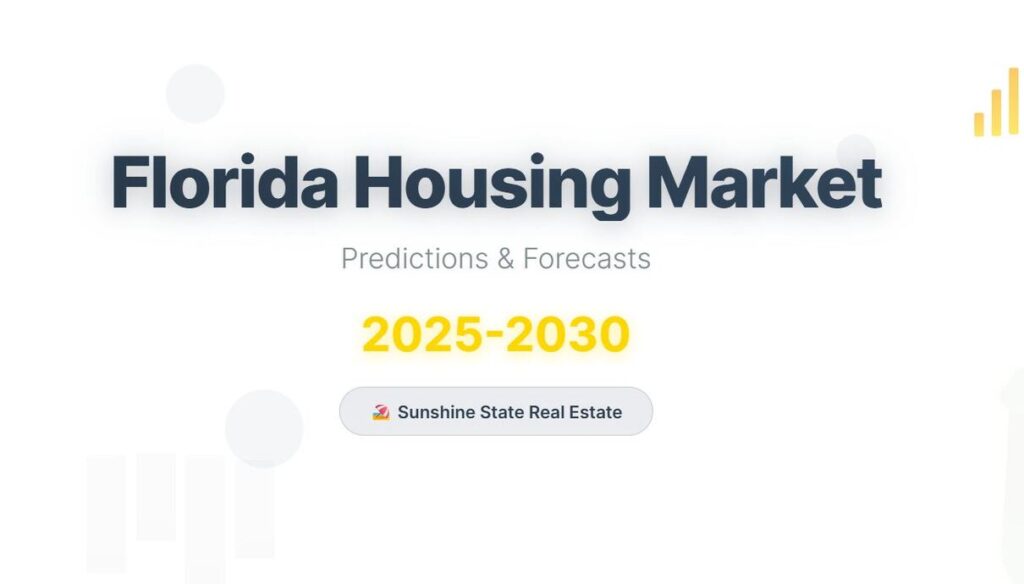Florida Housing Market Forecast 2025-2030: Will Prices Soar or Cool Down?
Is the Florida real estate market poised for a downturn, or will it continue as a promising destination for homeowners and investors? As the Sunshine State experiences shifts in supply, population growth, and economic factors, understanding the upcoming trends is essential for anyone interested in Florida real estate.
Current Snapshot of Florida’s Housing Market (Mid-2025)
After years of red-hot activity, the Florida housing market is starting to show signs of moderation. Here’s a concise look at recent data from Florida Realtors, highlighting key metrics as of May 2025:
| Metric | Value | Year-over-Year Change |
|---|---|---|
| Median Single-Family Home Price | $415,000 | -2.7% |
| Median Condo/Townhouse Price | $310,000 | -6.1% |
| Inventory (Single-Family) | 5.6 months | +28.8% (increase in listings) |
| Inventory (Condo/Townhouse) | 10.3 months | +28.8% (increase in listings) |
| Closed Sales (Single-Family) | 24,756 | -5.7% |
| Closed Sales (Condo/Townhouse) | 8,345 | -19.9% |
| Mortgage Interest Rates | Approximately 6.5% | Fluctuating |
| Insurance Premiums | Significantly Higher | Impacting affordability |
What This Means For Buyers and Sellers
- Buyers now enjoy more negotiating power with higher inventory and reduced bidding wars, especially in the condo and townhouse sectors.
- Sellers should expect a market correction and price adjustments; realistic pricing is crucial.
- Mortgage rates hovering near 6.5% add to affordability challenges, as do rapidly increasing homeowners insurance costs.
Key Factors Shaping Florida’s Housing Market Dynamics
Understanding what’s driving changes in Florida’s property market helps grasp why prices are adjusting and what future trends might look like.
Population Growth Is a Powerful Engine
Florida’s population is projected to exceed 25 million residents by 2030. Ongoing migration from other states fuels sustained housing demand, particularly in both urban and suburban centers. The U.S. Census Bureau confirms Florida as one of the top-growth states, supporting long-term real estate appreciation.
Economic Growth Exceeds National Averages
Florida enjoys robust economic expansion, bolstered by diverse industries such as tourism, technology, and healthcare. This job growth underpins housing needs but remains vulnerable to global economic shifts and trade policies, which could slow momentum.
Interest Rate Uncertainty
Mortgage rates directly affect purchasing power. While currently near 6.5%, upcoming Federal Reserve decisions will influence rates, creating market volatility and posing a challenge for affordability.
Increased Inventory Balances Market Demand
A surge in listings—up nearly 29%—means sellers face stiffer competition, tempering price growth. Condo markets particularly reflect a buyer’s environment with over 10 months of supply.
Rising Costs and Affordability Issues
- Skyrocketing homeowners insurance premiums, especially in hurricane-prone coastal areas, weigh heavily on buyers.
- Post-Surfside tragedy condo regulations are tighter, increasing compliance costs and reducing affordability.
- HOA fees and special assessments have surged, adding ongoing expenses for many property owners.
Environmental Risks Impact Decisions
Frequent hurricanes and sea-level rise contribute to rising insurance costs and add an element of risk in coastal zones, influencing buyer preferences and insurance market conditions. The impact of Hurricane Ian serves as a sobering example of these vulnerabilities.
Florida Real Estate Market Outlook 2025-2030
Short-Term Forecast (2025-2026): Market Adjustment Period
- Expect a modest decline or stabilization in home prices, especially in areas that had previously overheated.
- Buyers can leverage greater negotiating power.
- Price corrections should be gradual, avoiding any sharp market crashes.
Long-Term Forecast (2027-2030): Renewed Growth Phase
- Fueled by continuous population and economic expansion, the housing market should rebound.
- Median home prices could climb steadily to between $470,000 and $500,000 by 2030.
- Controlling insurance premium rises is critical to sustaining growth.
| Year | Projected Median Home Price | Annual Growth Rate |
|---|---|---|
| 2025 | $415,000 | -2.7% (from 2024) |
| 2026 | $403,745 | -2.7% (approximation) |
| 2027 | $420,095 | +4% |
| 2028 | $436,899 | +4% |
| 2029 | $454,375 | +4% |
| 2030 | $472,550 | +4% |
Regional Variations: Not All Florida Markets Are Equal
Miami & Fort Lauderdale
- International buyer interest supports demand.
- High insurance rates and condo regulations pose challenges.
Orlando & Tampa
- Strong job markets drive stable housing demand inland.
Southwest Florida
- Hurricane damage may offer short-term buying opportunities with bargain prices but beware future repair costs and risks.
Jacksonville & Naples
- These areas provide a balanced mix of affordability and luxury real estate options.
Smart Tips for Florida Homebuyers and Investors
- Evaluate flood risk and insurance costs carefully before purchasing.
- When considering condos, scrutinize HOA financial health to avoid unexpected expenses.
- View Florida real estate as a long-term investment rather than a get-rich-quick opportunity.
- Stay informed about local market trends and regulatory changes.
Conclusion: A Shifting but Resilient Market
Florida’s housing market is navigating a period of stabilization after several years of rapid growth. While a cooling-off phase presents challenges such as higher insurance premiums and affordability constraints, Florida’s enduring appeal—bolstered by strong population trends and economic growth—suggests a steady, optimistic rebound ahead.
Buyers have unique opportunities for negotiation today. Sellers should adopt realistic pricing strategies. Above all, all market participants should conduct thorough research and seek expert guidance to make informed decisions.
Invest in Florida’s Most Promising Real Estate Markets
Explore quality properties poised for rental income and long-term appreciation.
Contact our experts today to grow your real estate portfolio confidently.
Call now for a free consultation:
(800) 611-3060


